|
|
 |
| Sec. 61
is frequently quoted to show that the income tax applies to "all
income from whatever source"...
|
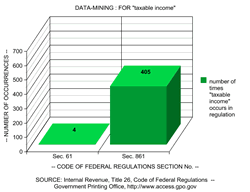
|
 Notice
four things about Sec. 61... Notice
four things about Sec. 61...
- "all income ... unless excluded"
- "more common items... are... excluded from gross income
entirely"
- "To the extent that another section ... provides specific treatment
for any item ... such other provision shall apply notwithstanding
61" [i.e. in spite of what it tells you about "all income"].
- The tax is on taxable income, not gross income.
 Data-mining can be used to show section 861 is far more specific than
section 61, and that "specific treatment for any item"
is actually found in section 861.
Data-mining can be used to show section 861 is far more specific than
section 61, and that "specific treatment for any item"
is actually found in section 861.
1. "TAXABLE INCOME" - "the
tax imposed is upon taxable income"
How to verify results
First, go to eCFR >> choose
Title 26 >> click Go button. Select Parts 1.61-1.169,
then click 1.61-1. Then click link near top named "Definition
of Gross Income, Adjusted Gross Income, and Taxable Income."
Now, use Edit > Find in your web browser to search for "taxable
income". Count the occurences of term in sections 61-1 through
61-22 only. Then, do the same for section 861. Repeat for all desired
code-terms.
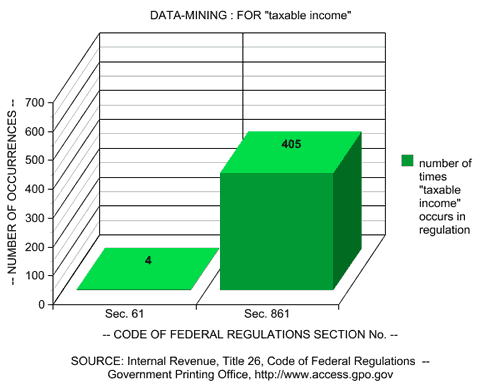
 Which section is more "specific" about
"taxable income" AND "shall apply notwithstanding
section 61"?
Which section is more "specific" about
"taxable income" AND "shall apply notwithstanding
section 61"?
 Fact: Section 861
Fact: Section 861
Notice, Sec. 63, which defines "taxable income" is
even less specific than section 61.
2. "GROSS INCOME"
"Gross income means all income ... unless..."
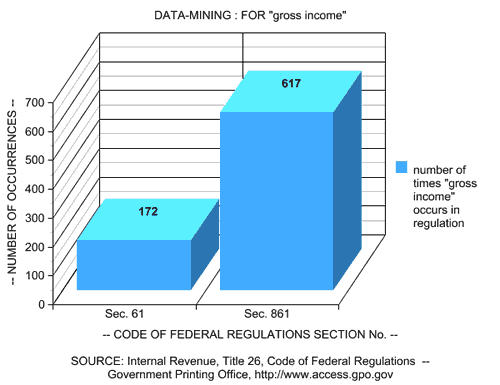
 Which section is more "specific" about
"gross income" AND "shall apply notwithstanding
section 61"?
Which section is more "specific" about
"gross income" AND "shall apply notwithstanding
section 61"?
 Fact: Section 861 has almost four times the number of details found
in 61.
Fact: Section 861 has almost four times the number of details found
in 61.
3. "SOURCE(S)"
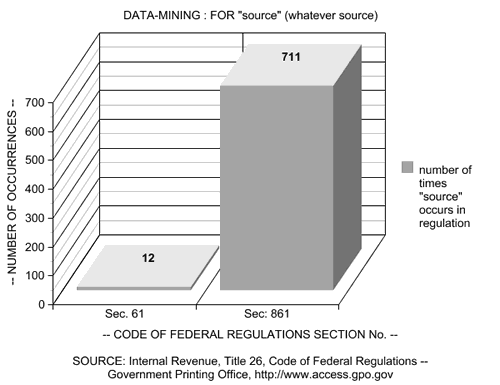
 Which section is more "specific" about
a "source" AND "shall apply notwithstanding
section 61"?
Which section is more "specific" about
a "source" AND "shall apply notwithstanding
section 61"?
 Fact: Section 861 provides much more specific treatment regarding the
source, whatever source.
Fact: Section 861 provides much more specific treatment regarding the
source, whatever source.
4. "DEDUCTION"
Did your tax professional ("expert") forget to tell you about
every deduction? (Ignorance is no excuse.)
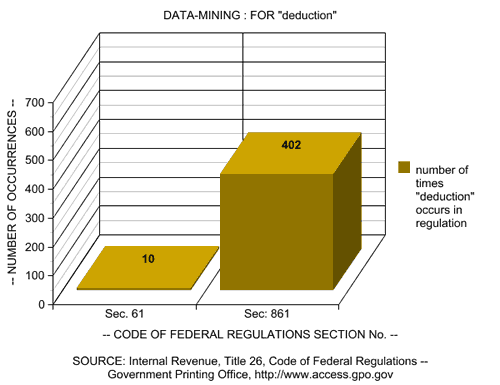
 Which section is more "specific" about
a "deduction" AND "shall apply notwithstanding
section 61"?
Which section is more "specific" about
a "deduction" AND "shall apply notwithstanding
section 61"?
 Evidently, section 861
Evidently, section 861
5. "EXEMPT INCOME"
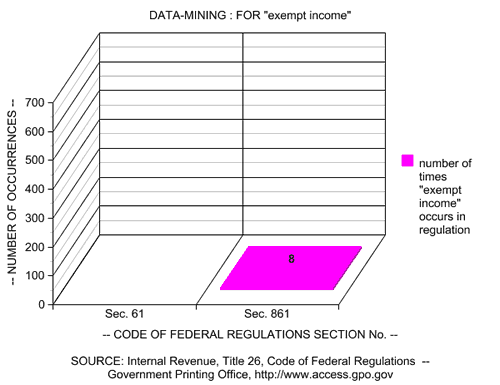
 Which section is more "specific" about
"exempt income" AND "shall apply notwithstanding
section 61"?
Which section is more "specific" about
"exempt income" AND "shall apply notwithstanding
section 61"?
 Evidently, section 861
Evidently, section 861
Note: "Exempt income" is
"defined" in Sec. 1.861-8T(d)(2)(ii)
6. "EXCLUDED INCOME"
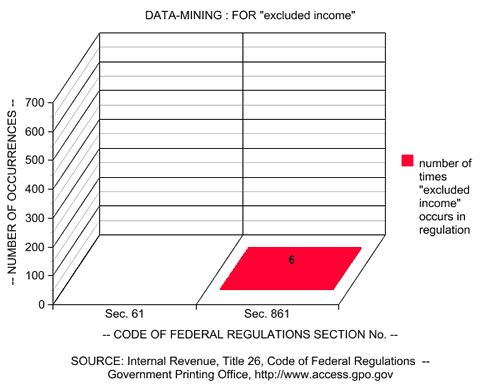
 Which section is more "specific" about
"excluded income" AND "shall apply notwithstanding
section 61"?
Which section is more "specific" about
"excluded income" AND "shall apply notwithstanding
section 61"?
 Evidently, section 861
Evidently, section 861
7. "ELIMINATED INCOME"
And just in case the meaning of exempt income and excluded
income escapes you...
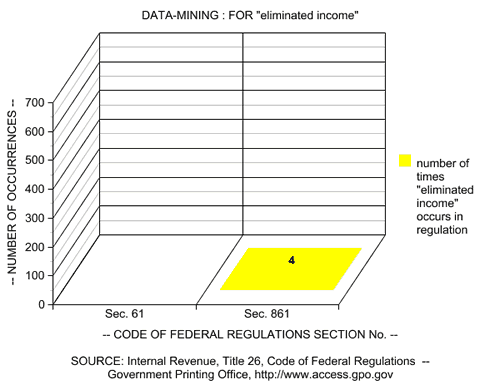
 Which section is more "specific" about
"eliminated income" AND "shall apply notwithstanding
section 61"?
Which section is more "specific" about
"eliminated income" AND "shall apply notwithstanding
section 61"?
 Evidently, section 861
Evidently, section 861
8. "SHALL" - the
command word
By far, the term most utilized to command those who are subject
to laws and regulations is "shall". According to
the dictionary, shall
means must.

 Which section is more "specific" about
the command "shall", AND so, "shall apply
notwithstanding section 61"?
Which section is more "specific" about
the command "shall", AND so, "shall apply
notwithstanding section 61"?
 Evidently, section 861
Evidently, section 861
9. "INCOME"
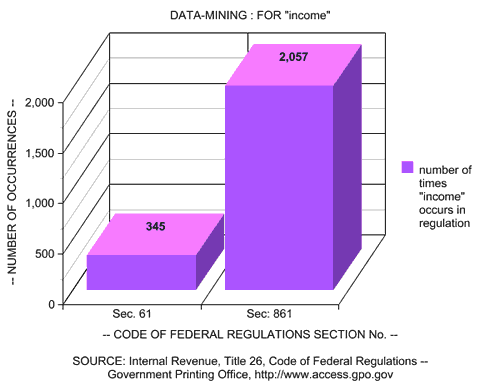
 Which section is more "specific" about
"income" AND "shall apply notwithstanding
section 61"?
Which section is more "specific" about
"income" AND "shall apply notwithstanding
section 61"?
 Evidently, section 861
Evidently, section 861
10. "SPECIFIC GUIDANCE"
Finally, for all those who may have misunderstood the specifics
for taxable income, gross income, sources of income, deductions, exempt
income, excluded income, eliminated income, or you just don't know which
section "shall apply", here is the tax law's "specific
guidance" ...
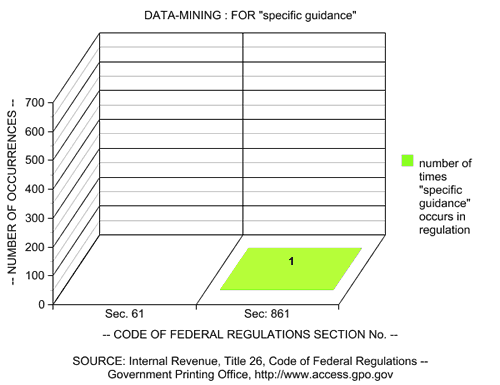
 So, which section provides "specific guidance" for doing your
income taxes?
So, which section provides "specific guidance" for doing your
income taxes?
 Fact: Section 861
Fact: Section 861
That's right... In US Tax Regulations
(Title 26) the term "specific guidance" occurs only
in Sec. 861. Verify it yourself.
If only one section has "specific
guidance," it should be a simple guess as to which section "shall
apply notwithstanding section 61."
| Ingredients: |
Sec. 61 |
Sec. 861 |
| taxable income |
4 |
405 |
| gross income |
172 |
617 |
| source |
12 |
711 |
| deduction |
10 |
402 |
| exempt income |
0 |
8 |
| excluded income |
0 |
6 |
| eliminated income |
0 |
4 |
| shall |
96 |
457 |
| income |
345 |
2057 |
| specific guidance |
0 |
1 |
| TOTALS |
639 |
4668 |
|
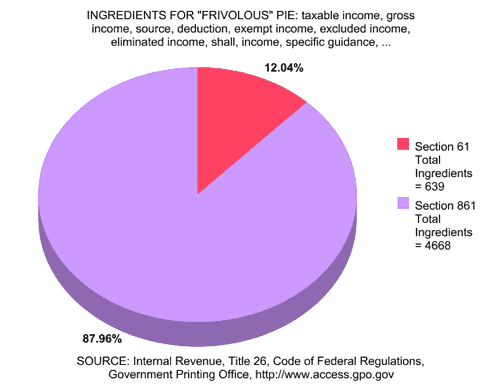
|
 Which section provides specific treatment and shall apply notwithstanding
61?
Which section provides specific treatment and shall apply notwithstanding
61?
 Answer: Sec. 861
Answer: Sec. 861
Some Income Tax History -
"Gains, Profits, and Income"
According to a principle of statutory
construction, "expressio unius est exclusio alterius", by
not listing domestic income, Section 861-8T(d)(2)(iii) has excluded
a citizens domestic income from the list of taxable income
(not exempt). See FindLaw
Dictionary for "expressio unius est exclusio alterius".
A quick look in old tax regulations
and we see that they also exclude domestic income. The very first income
tax regulations from 1913 provided a clear picture of what taxable income
shall consist of, and what gross income includes...
gains, profits, and income.
- First, see U.S.
Tax Regulations - 1913
- Art. 3. "NET INCOME
shall consist of ... gains, profits, and income"
- Art. 4. "Gross income
includes all gains, profits, and income"
- Now, search the recent, modern-day tax regulations for "gains,
profits, and income". Notice, every single result
applies only to foreign earned incomes, and a foreigner's income.
(Part.Sec)
1.306-3
1.451-1
1.6038-2
1.6041-1
1.6042-1
1.861-7
1.862-1
1.863-2
1.863-3
1.863-3A
1.864-4
1.871-7
1.881-2
1.902-3
1.902-4
514.115
*Results Total 16 |
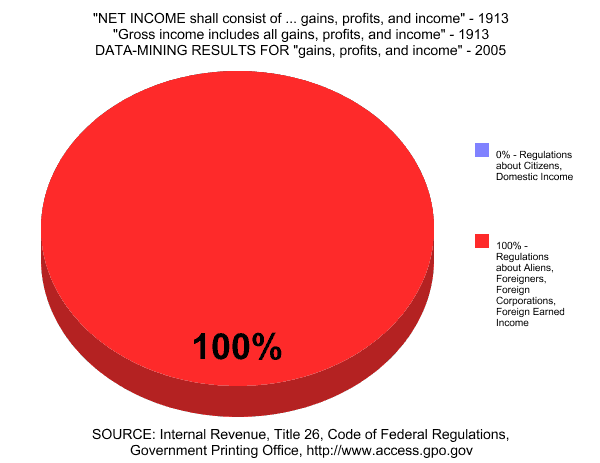 |
* The total also includes the search
results for "gains, profits, or
income."
 The
1954
Internal Revenue Code also produces only foreign-related-income
sections when searched for "gains, profits,
and income." And, the 1954 Code makes the same pie as
the 1913 tax rules do, above. 1954 IRCode Results:
Secs. 306, 861, 862, 863, 871, 881, 902, 1361, 1441, 6041, and 6042. The
1954
Internal Revenue Code also produces only foreign-related-income
sections when searched for "gains, profits,
and income." And, the 1954 Code makes the same pie as
the 1913 tax rules do, above. 1954 IRCode Results:
Secs. 306, 861, 862, 863, 871, 881, 902, 1361, 1441, 6041, and 6042.
|
|
|
|
Attention Researchers
If any link has disappeared, try to copy and
paste the link address at http://www.archive.org
-- DISCLAIMER --
The intended purpose of this website, WhatisTaxed.com,
is to data mine with a computer the Internal Revenue Code, and
the Code of Federal Regulations, Title 26, for the "codes" (e.g.
taxable income, gross income, excluded income, eliminated income,
exempt income, deductions, allocation, apportionment, etc),
for rules, and instructions, for determining income tax. The
results have been published throughout this website. It should
be evident these search methods may be applied to any Title
of Law, or large volume of text, and in any country that
has codified laws and rules. See How to Search.
Nothing is for sale at WhatisTaxed.com.
Information posted at WhatisTaxed.com should not be
considered legal advice and is solely for educational purposes.
The reader should not rely on information provided herein to
determine tax.
Do not accept this
website as tax advice.
WhatisTaxed.com is only tax research from data mining tax
law.
To contribute - See How to Search, and Contact
Us.
We do not sell, promote, or advise anything,
but data-mining, searching, and reading tax code with the only
appropriate code tool ... your computer.
We do find every occurrence of a particular
code-term to establish precisely what is written, and what is
not written in tax law. When we say, no other rule
or statute exists - for example, regarding excluded
income, we show you how many files contain this important
code term, and how we searched for it with a computer. You can
easily verify any of the laws, rules, or code-terms in question,
and you should verify every result because it is your duty
to know and follow the law. Ignorance is no excuse.
You are
responsible for doing your taxes.
Questions: If you have questions, try asking
your Congressperson or Senator.
 Ask your lawmaker to explain these Sec. 861 search
results ...
Ask your lawmaker to explain these Sec. 861 search
results ...
- "eliminated income" - Sec. 1.861-8(d), 1.861-8(d)(2),
1.861-8T(d)(2)
- "excluded and eliminated items of income" - Sec.
1.861-8T(d)
- "eliminated items" - Sec. 1.861-8T(d)
- "excluded income" - Sec. 1.861-8 and 1.861-8T
- "income that is exempt or excluded" - Sec. 1.861-8T(d)(2)
- "specific sources" - Sec. 1.861-8(a)(1)
- "specific guidance" - Sec. 1.861-8(a)(1)
- "how to determine taxable income" - Sec. 1.861-8(a)(1)
- "the rules [of Sec. 1.861-8 ...] for determining
taxable income" - Sec. 1.863-1(c)
- "Exempt income ... defined" - Sec. 1.861-8T(d)(2)(ii)
- "income that is not considered tax exempt" [i.e.
taxable income] - Sec. 1.861-8T(d)(2)(iii)
Source: http://ecfr.gov
Ask your Congressman and Senator ...
 If "Exempt income" is "defined"
in Sec. 861, why is Sec. 861 frivolous?
If "Exempt income" is "defined"
in Sec. 861, why is Sec. 861 frivolous?
Find your Congressperson: http://www.house.gov
Find your Senator: http://www.senate.gov
Answers: If you want answers, you can try
asking the press - the American
media and foreign
media.
The Code of Federal Regulations
When searching tax law, we pay close attention
to 26 CFR...
"the Official Interpretation"
"Federal Income Tax Regulations
(Regs) are the official Treasury Department interpretation of
the Internal Revenue Code"
- Internal
Revenue Manual, 4.10.7.2.3.1
"Federal Tax Regulations pick
up where the Internal Revunue Code (IRC) leaves off by providing
the official interpretation of the IRC"
- http://www.irs.gov/taxpros/article/0,,id=98137,00.html
The Code of Federal Regulations are the rules, written
in plain English, which both the public and the IRS must follow:
"The Service is bound by the
regulations."
- Internal
Revenue Manual, 4.10.7.2.3.4
Since "the Service is bound," we can be sure that
we are playing by the same rules. It does not require a law
degree to understand them. See How to Search and Search Examples.
|
|



